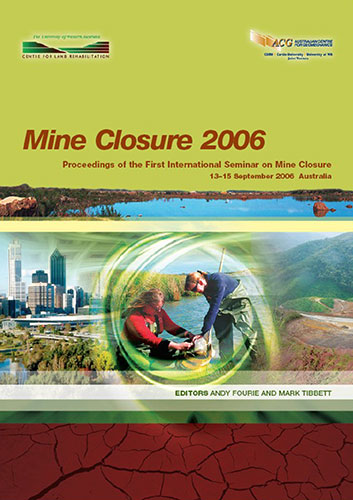The Socio-Economic Implications of Mine Closure ⎯ A South African and Zimbabwean Scenario

|
Authors: Mugonda, M Paper is not available for download Contact Us |
DOI https://doi.org/10.36487/ACG_repo/605_74
Cite As:
Mugonda, M 2006, 'The Socio-Economic Implications of Mine Closure ⎯ A South African and Zimbabwean Scenario', in AB Fourie & M Tibbett (eds), Mine Closure 2006: Proceedings of the First International Seminar on Mine Closure, Australian Centre for Geomechanics, Perth, pp. 829-834, https://doi.org/10.36487/ACG_repo/605_74
Abstract:
The late Julius Mwalimu Nyerere, first President of Tanzania, once said that “The purpose of development …is the creation of conditions… which enable man the individual, and man the species, to become his best.” In recent years, growing awareness that the conducive environment for business prosperity and economic growth is vulnerable to government activities/politics - government policies and regulations, has been matched by the realisation that mineral resources need to be managed in an integrated and systematic way, to ensure these resources contribute positively to current and future generations. Mining contributes significantly to economic activities, fixed investment, employment opportunities, infrastructure, secondary industries, gross capital formation and foreign exchange earnings in South Africa and Zimbabwe. The mining industry considers that the investment climate in terms of government policy, laws and regulations must be appropriate to the encouragement of private sector mining activity. It is believed that these factors have improved in South Africa and deteriorated in Zimbabwe. Political instability, economic meltdown and the lack of a positive track record on policy, together with external factors such as declining commodity prices, competition from other mining countries and global financial crises, have resulted in negative economic growth in Zimbabwe. The new political dispensation has improved the investment environment in South Africa (Granville, 2001). Mining-led settlement is often associated with tensions between corporate mining objectives, recipient community needs and state policies and goals for regional development. Mining-based settlement formation is therefore predicated on the continued availability of the mineral resource, the economic viability of its extraction and the vagaries of the mineral price fluctuations in the international minerals markets (Tanzier, 1980). As Wekwete (1994) observed: Urbanisation in Southern Africa is a product of colonial exploitation of primary raw materials …. Urban centres were created to service exploitation of primary products. In many cases they did not receive any more investment than that required for them to perform their services. In mining towns, for example, companies aimed to create centres whose existence was directly relevant to the mine, and hence when the minerals are depleted they become 'ghost' towns.
References:
African Briefing No. 38 (2006) International Crisis Group – Working to prevent conflict world-wide, Zimbabwe’s
continuing self-destruction.
Chipungu, L. (2006) Governance in Zimbabwe, Department of Rural and Urban Planning, University of Zimbabwe –
paper presented to the conference ‘(Re-) Conceptualising Democracy and Liberation in Southern Africa’, which
was organized in July 2002 by the Nordic Africa Institute in collaboration with local partners in Windhoek,
Namibia (see the report in News no. 3/2002).
Clark, A. (1999) A Legal and policy framework for environmental management in the South African mining industry,
Department of Minerals and Energy.
Granville, A. (2001) Baseline survey of the mining and minerals sector: Research Topic 6, Mining, Minerals and
Sustainable Development, MMSD Southern Africa.
Hattingh, H., Claassen, M., Viljeon, P., Van Wyk, J., Murray, K. and Roux, D.J. (2005b) Implementing Resource
Directed Water Quality Management: From Policy to Management Instruments to Operational Adoption, Draft
Paper submitted for the 2005 SANCIAHS Conference, South Africa.
Mushonga, H. (2006) Zimbabwe Plans to Nationalise all Zimbabwe’s Mines. Institute for war and peace reporting,
Environment News Service (ENS).
Musvoto, A.N. (2001) Gender and mining community: Mining and Society: Research Topic 3, Mining Minerals
Sustainable Development Southern Africa - Input to: MMSDSA Regional Research, Compiled by: Scientific and
Industrial Research Centre, Harare, Zimbabwe for: African Institute of Corporate Citizenship.
Oppenheimer, N. (14 June 2005) Speech to an audience at London’s International Institute for Strategic Studies,
SARPN – NEPAD related issues and documents.
SA Government Information – About SA – Minerals, Energy and Geology (www.gov.za).
Peta, B. (2006) Business report – Business must unite against Mugabe’s tyranny, Business Report and Independent
online (Pty) Ltd, www.busrep.co.za.
The state of government in 28 African countries, Governance survey of experts Part 1, United Nations Economic
Commission for Africa.
Tanzier, M. (1980) The Race for Resources: Continuing Struggles Over Minerals and Fuels, New York: Monthly
Review Press.
Tapela, TN. (2002) Regenerating Africa Through Planning. Paper Presented at the Planning Africa 2002 International
Conference, 18-20 September 2002; ICC, Durban.
Wekwete, K.H. (1994) Introduction, in K H Wekwete and C O Rambanapasi (eds), Planning Urban Economies in
Southern and Eastern Africa, Aldershot: Avebury.
The Socio-Economic Implications of Mine Closure
― A South African and Zimbabwean Scenario
M. Mugonda
834 Mine Closure 2006, Perth, Australia
© Copyright 2026, Australian Centre for Geomechanics (ACG), The University of Western Australia. All rights reserved.
View copyright/legal information
Please direct any queries or error reports to repository-acg@uwa.edu.au
View copyright/legal information
Please direct any queries or error reports to repository-acg@uwa.edu.au